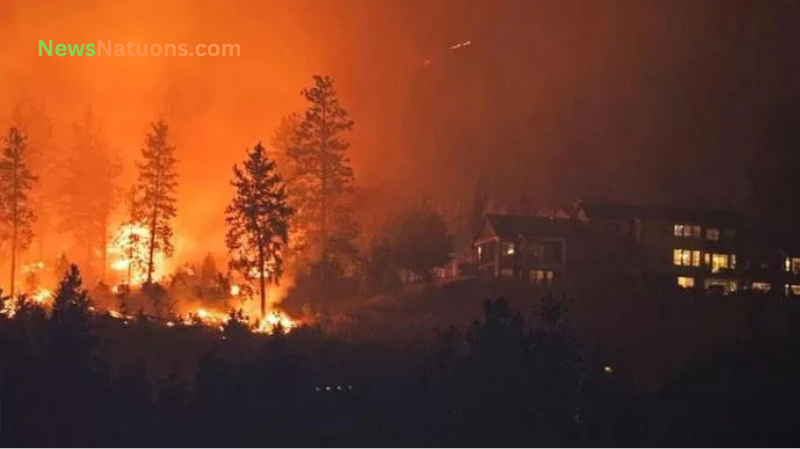The wildfires raging through Canada have now reached a terrifying scale, with more than 200 separate fire zones reported across the country. The situation continues to worsen as flames sweep through provinces like British Columbia, Quebec, and Alberta. What began as isolated fire outbreaks has now escalated into one of the most severe environmental crises the country has witnessed in recent years.
Thousands Forced to Flee Their Homes
According to international media reports, over 27,000 people have been displaced due to the spreading inferno. Families have had to abandon their homes and belongings, seeking refuge in safer regions. Emergency shelters have been set up to accommodate the growing number of evacuees, while government agencies and volunteers work tirelessly to ensure basic necessities like food, water, and medical aid are provided.
Emergency Declared Across Affected Provinces
In response to the escalating danger, emergency declarations have been made across the affected provinces. British Columbia and Alberta have activated full-scale rescue and firefighting operations. Helicopters, fire trucks, and ground crews have been deployed in large numbers, trying desperately to contain the fires. Yet the task is daunting, as strong winds and high temperatures continue to fan the flames, making it nearly impossible to gain full control.
Smoke Spreads Beyond Borders into the U.S.
The environmental impact of the wildfires is not limited to Canada alone. The dense smoke generated by these fires has now started drifting southward into the United States. Several U.S. states, particularly in the northern regions, have reported a significant drop in air quality. Health warnings have been issued, especially for children, the elderly, and people with respiratory issues.
U.S. Sends Help to Canada
Recognizing the scale of the disaster, the U.S. has announced it will send emergency teams to assist with relief efforts in Alberta. American firefighters and rescue professionals are preparing to join their Canadian counterparts in the battle against the relentless blaze. This cross-border cooperation reflects the urgency of the situation and the need for international solidarity in the face of climate emergencies.
Climate Change and Drought Blamed for Severity
Experts believe that climate change and prolonged drought conditions are major contributors to the intensity and spread of the fires. Rising global temperatures have led to drier landscapes, which ignite more easily and burn more aggressively. Scientists warn that unless serious action is taken to combat climate change, such natural disasters will become increasingly common and more destructive in the years to come.
Firefighters Face Exhaustion and Danger
The firefighters on the ground are operating under extreme conditions, battling towering flames, thick smoke, and relentless heat. Many have been working around the clock without proper rest. Reports indicate that several firefighters have suffered injuries, while others are experiencing fatigue and dehydration. The mental and physical toll of the disaster on first responders is immense.
Wildlife and Natural Habitat Devastated
The fires have also taken a massive toll on Canada’s natural ecosystem. Thousands of acres of forest have been reduced to ash, and countless wild animals have either perished or been displaced. Environmentalists warn that the destruction of such vast green areas could lead to long-term ecological imbalance, including the extinction of species and the degradation of biodiversity.
Government Urges Public to Stay Vigilant
Canadian authorities have urged the public to stay informed and adhere to all safety instructions issued by emergency services. People living near fire-prone areas have been asked to remain prepared for evacuation and avoid taking unnecessary risks. Updates are being provided regularly through television, radio, and social media channels to keep citizens aware of the latest developments.
Hope Amid the Crisis
Despite the devastation, stories of bravery and resilience continue to emerge. From firefighters risking their lives to volunteers helping displaced families, the human spirit shines through even in the darkest of times. Relief efforts are being ramped up, and with continued international support, there is hope that the fires will eventually be brought under control.
کینیڈا کے جنگلات میں لگی آگ اب خوفناک حد تک پھیل چکی ہے، اور ملک بھر میں 200 سے زائد مختلف مقامات پر آگ بھڑک رہی ہے۔ یہ صورت حال دن بہ دن بگڑتی جا رہی ہے، خاص طور پر برٹش کولمبیا، کیوبیک، اور البرٹا جیسے صوبے بری طرح متاثر ہوئے ہیں۔ ابتدائی طور پر یہ آگ محدود علاقوں تک تھی، لیکن اب یہ ملک کی حالیہ تاریخ کی سنگین ترین ماحولیاتی آفت میں تبدیل ہو چکی ہے۔
ہزاروں افراد نقل مکانی پر مجبور
عالمی میڈیا کے مطابق 27 ہزار سے زائد افراد کو اپنے گھر چھوڑ کر محفوظ علاقوں کی طرف جانا پڑا ہے۔ لوگ اپنے گھروں اور قیمتی سامان کو پیچھے چھوڑ کر ایمرجنسی شیلٹرز میں پناہ لینے پر مجبور ہیں۔ حکومت اور رضا کار ادارے بے گھر افراد کو خوراک، پانی اور طبی امداد فراہم کرنے میں مصروف ہیں۔
متاثرہ صوبوں میں ایمرجنسی نافذ
صورتحال کی سنگینی کے پیشِ نظر برٹش کولمبیا اور البرٹا سمیت کئی صوبوں میں ایمرجنسی نافذ کر دی گئی ہے۔ بڑے پیمانے پر فائر بریگیڈ، ہیلی کاپٹرز اور ریسکیو ٹیمیں آگ بجھانے میں مصروف ہیں۔ لیکن تیز ہواؤں اور شدید گرمی کی وجہ سے آگ پر قابو پانا تقریباً ناممکن ہو چکا ہے، اور ہر گزرتے دن کے ساتھ حالات مزید بگڑتے جا رہے ہیں۔
دھواں امریکہ تک پھیل گیا
آگ سے پیدا ہونے والا دھواں اب صرف کینیڈا تک محدود نہیں رہا بلکہ امریکہ کے شمالی علاقوں تک جا پہنچا ہے۔ کئی امریکی ریاستوں میں فضائی آلودگی میں خطرناک حد تک اضافہ ہوا ہے۔ بچوں، بوڑھوں اور سانس کی بیماریوں میں مبتلا افراد کو خاص طور پر احتیاط برتنے کی ہدایت کی گئی ہے۔
امریکہ نے امدادی ٹیمیں بھیجنے کا اعلان کیا
صورتحال کی سنگینی کے پیش نظر امریکی حکومت نے کینیڈا کے صوبے البرٹا میں امدادی ٹیمیں بھیجنے کا اعلان کیا ہے۔ امریکی ریسکیو اہلکار جلد ہی کینیڈین ٹیموں کے ساتھ مل کر آگ بجھانے کے عمل میں شریک ہوں گے۔ یہ اقدام دونوں ممالک کے درمیان یکجہتی اور ماحولیاتی بحران سے نمٹنے کے لیے باہمی تعاون کی علامت ہے۔
موسمیاتی تبدیلی اور خشک سالی کو ذمہ دار قرار دیا گیا
ماہرین کے مطابق اس ہولناک آگ کی شدت اور رفتار کا سب سے بڑا سبب موسمیاتی تبدیلی اور خشک سالی ہے۔ بڑھتے ہوئے درجہ حرارت نے زمین کو خشک اور نازک بنا دیا ہے، جس کی وجہ سے آگ تیزی سے بھڑکتی ہے اور پھیلتی ہے۔ ماہرین خبردار کرتے ہیں کہ اگر موسمیاتی تبدیلیوں کے خلاف مؤثر اقدامات نہ کیے گئے تو ایسے قدرتی سانحات معمول بن جائیں گے۔
فائرفائٹرز شدید مشکلات کا شکار

آگ بجھانے والے اہلکار خطرناک حالات میں کام کر رہے ہیں۔ کئی فائرفائٹرز کو زخمی ہونے کی اطلاعات ہیں جبکہ دیگر شدید تھکن، گرمی اور پانی کی کمی کا شکار ہو رہے ہیں۔ ان کی جسمانی اور ذہنی صحت شدید متاثر ہو رہی ہے، لیکن وہ اپنی جان خطرے میں ڈال کر لوگوں کو بچانے میں مصروف ہیں۔
جنگلات اور جنگلی حیات کو شدید نقصان
آگ نے کینیڈا کے قدرتی ماحول کو شدید نقصان پہنچایا ہے۔ ہزاروں ایکڑ جنگلات جل کر راکھ ہو چکے ہیں جبکہ بے شمار جنگلی جانور ہلاک یا بے گھر ہو چکے ہیں۔ ماہرین ماحولیات خبردار کر رہے ہیں کہ اس نقصان سے قدرتی توازن بگڑ سکتا ہے، جس کے نتیجے میں کئی اقسام کے جانور معدوم ہونے کا خدشہ ہے۔
حکومت کی عوام کو احتیاط کی ہدایت
کینیڈین حکومت نے عوام کو خبردار کیا ہے کہ وہ تازہ ترین ہدایات پر عمل کریں اور خطرے کی صورت میں فوری انخلا کے لیے تیار رہیں۔ حکومت کی جانب سے مسلسل اپڈیٹس ٹی وی، ریڈیو اور سوشل میڈیا پر فراہم کی جا رہی ہیں تاکہ عوام باخبر رہیں۔
امید کی کرن باقی ہے
اگرچہ حالات سنگین ہیں لیکن اس بحران کے دوران انسانی ہمت و حوصلے کی کئی مثالیں سامنے آ رہی ہیں۔ فائرفائٹرز، رضا کار اور عوام سب مل کر اس آفت کا مقابلہ کر رہے ہیں۔ بین الاقوامی مدد اور مشترکہ کوششوں کے ساتھ یہ امید باقی ہے کہ آگ پر جلد قابو پا لیا جائے گا اور زندگی معمول پر واپس آ سکے گی۔











